QuestionQUESTION: Hi!!! I've been speaking with Jessica for a few nights now about what has been going on with the cat and kittens who were feral that I've rescued, she has been great but this website said I'm asking to many follow ups, so bear with me while I try to break this all down !!! I rescued a female feral and 4 kittens who decided to hang out under my car in a very urban area. I also have a dog and 2 cats who are my pets. I've kept everyone (the feral and my pets) separate while I socialize the ferals and about 3 weeks ago the kittens and I had a break through and they are ready to be adopted. The mamma started showing signs of pregnancy last week and her stomach is huge. I came home 2 nights ago and there was a newborn the floor so I assumed it was from the mamma who clearly is preggers. She was ignoring it and there were no other babies even though her belly was and is still huge. I was very worried about why she wasn't delivering the rest of the litter and have spent hours and hours researching and calling around trying to do whats best. Long story short she didn't give birth to it one of her kittens did who showed no sign of being preg. They are both mothering it and its really cute even though the reason I rescued them was to find them good homes and make sure the all got fixed. Now I have a newborn, a mom who looks like she'll give birth to 20 kittens at any moment, her other 3 kittens (who are much older than I thought.. I thought they were about 3 or 4 months) as well as MY pets!!! Once I solved the mystery of who the "baby momma" is I thought I could relax a little. On closer inspection of the newborn (I've only handled it a little) I'm almost certain it has a deformity it in its front paws. They bend back instead of forward at the area that I guess would be the wrist on us. Its not severe but it does move around like that, the back paws are fine. I am heartsick. Can this little one be helped??? I've put sooo much time and effort into this and it is so amazing to see how much the mother (I call her Rebel) loves her baby, that I'm worried that this might be permanent. How long should I wait until I have the baby looked at. She was born on Wednesday. Do you know of any organizations that might help. I there anything I should be doing now to correct it??? Keep in mind Rebels mother looks like she'll be giving birth at any moment and I'm a little overwhelmed!!! Thanks in advance for any advice you can give !!!! Cheri
ANSWER: Cheri,
It's wonderful to see that I'm not the only one caring for countless abandoned cats and kittens. Although there is a significant difference between a feral cat and a stray cat many people use these terms interchangeably, hopefully the definition that follows will help you determine which kind of kitties you have on your hands. A feral cat is a wild animal who has never had contact with human beings. Feral cats are often willing to do anything to get away from human beings, even those with the best of intentions, because they haven't been socialized during the critical first few weeks of life to see human beings as sources of food, affection and comfort. A stray cat has lived in a home at some point during their life and received the socialization during the first few weeks of life to enjoy the company of people. Stray cats become strays because their human caregivers have abandoned them, they've run away from home or in some cases they've been left behind when their human family moves. Living on the streets can be difficult for a cat, unfortunately the world is a dangerous place for such small beings and too many cruel people view stray cats as vermin to be abused or even killed. It's not unusual for a stray cat or kitten to need some time to warm up to humans again, especially if they've been on their own for awhile. It sounds like you've done a great job rehabilitating these former pets, but since the process happened so easily and quickly it sounds to me like you've rescued an entire family of strays, possibly "siblings" that were abandoned to fend for themselves together.
It's a good thing for these kitties that you were willing to put the time, energy and care into them and provide them with a safe place to live for the moment. I know that it can be difficult to care for so many different furry personalities with different needs under one roof so I felt that it might be a good idea to run through some options that will hopefully help make things easier for the rescued kitties and your own pets. Since these kitties were likely abandoned you haven't got any information about them which is a disadvantage especially since at least two of the girls were pregnant. I would recommend that you continue to keep these rescues completely isolated from your own resident pets to avoid any possibility of spreading viral or bacterial infections throughout the pets in your home. Be sure to take all hygienic precautions when handling the rescued kitties, this is for the protection of your own resident pets as well as these rescued orphans.
I know that rescuing pets can take a huge toll on finances, but it's in the best interests of you and your rescues if they are checked over by a vet for any obvious signs of illness. Your vet can also confirm whether any of the other rescues will be giving birth anytime soon, it does sound like you're going to be the proud foster parent of several new kittens in the next while. I realize that taking all of the rescued cats to the vet may not be financially feasible because it's quite pricey, however there are possible courses of action that can ensure that the cats receive the medical attention they need. These cats are so lucky that they've found such a great foster mom who is willing to care for them until they're ready to be placed in their forever homes. Since these kitties are rescues, your local shelters or rescue groups may also be willing to cover the cost of medical care and basics like spay/neuter surgeries, vaccines, treatment of internal/external parasites. There are many organizations beyond your local shelter, vet clinics and rescue groups which may be prepared to help you out, some are specifically designed to help those who rescue stray/abandoned animals. It's not unreasonable to say that these kitties probably wouldn't stand much of a chance in your average shelter or rescue group simply because they need a bit of extra TLC for now, however your local shelter or rescue groups may be willing to help you out with the cost of caring for these cats and kittens, in fact they may list you as a foster parent which would enable you to potentially keep these cats until the right homes were found for them. I am prepared to offer the names of organizations and resources which may be prepared to partially or completely cover the cost of treatment for your rescued strays. I do have a fairly extensive list of organizations which offer help to pet parents/rescuers in need of financial assistance and since it isn't practical for me to list every resource in every situation where someone needs a bit of extra support it would be easier for me if you'd be willing to let me know the general area that you're writing from.
Giving birth to a single kitten does happen on occasion, but it's not very common. There is a possibility that there are stragglers who've been left behind that haven't been born yet for one reason or another. Obviously if there are any kittens that have been left behind inside this new mom it's important to get them out one way or the other as quickly as possible to avoid serious health complications for the mother cat. A vet will be able to confirm whether your single newborn is an only child or has unborn siblings at this point, most likely through an x-ray. If the vet finds kittens on an x-ray s/he may want to do an ultrasound to see if the kittens are still alive in utero as this will determine the type and amount of anesthesia to used during the caesarian surgery if it's necessary. As for the deformity on the single newborn's front legs I can't really offer much of an opinion about this as I haven't seen it for myself and I'm not a qualified vet. A skilled vet would be best qualified to give you information about what the problem is, whether it's a matter of tendons and ligaments being too tight or if there are issues with the kitten's bones. As far as I'm aware the vet will probably be able to treat the kitten using minimally invasive methods if it's simply a matter of tendons or ligaments needing to be stretched. If there is a bone deformity then it becomes a question of how serious the problem is, what type of treatment the kitten will need, whether treatment is painful, expensive and invasive enough to rule it out. I wish that I could offer you reassurance and tell you how likely this issue is to be permanent, but I would only be guessing at best. A vet will also be able to tell you what effects this deformity might have on this kitten's mobility as s/he ages, if there won't be any lasting problems or the disability would be minimal it's possible the kitten won't need any treatment at all.
Since newborn kittens are born with minimal resistance to infection it's important to keep the pregnant/expectant moms and their litters separated from the other animals in the household if at all possible. Unfortunately it's likely that none of the rescued strays you've taken in have had their vaccines it's important to handle the expectant moms and any newborn kittens as though they have no resistance to viral or bacterial infections. This means that you'll need to make sure that any bedding in the nest boxes are clean and dry at all times. Anyone handling the new moms or their babies should wash their hands thoroughly with soap and hot water prior to handling the families. I would also recommend that you wash and sanitize food/water bowls every day using a weak bleach solution, I usually use 5 parts water to 1 part bleach, it's strong enough to kill germs without overdoing it. Sanitizing the litter pans weekly using the same bleach solution is also a good idea.
I would recommend that you make sure to keep a small litter box that young kittens can get into without help because potty training lessons from mom start pretty early on. It's probably best for you to use something disposable because litter boxes can be pricey, when I foster nursing moms or young kittens I find that a foil roasting pan (the same size you'd use for cooking a turkey) is a cheap, sturdy alternative to purchasing litter pans from your local pet store. It's probably best to avoid using scented litter because some cats are sensitive to the dyes and perfumes commonly used in these products which can cause house soiling.
The mother cats should be eating as much as they want of a high quality cat food, I usually feed a mix of a homemade raw diet and a commercially produced high quality, holistic cat food, made from human grade ingredients. I've found that there are fewer issues with vomiting and loose stool, as an added bonus feeding a higher quality diet allows for healthier cats (and fewer vet bills). Another interesting thing about feeding a high quality diet like the one I recommend is that your cats will use the litter less frequently and their litter box contents won't smell as strongly. I would encourage you to check out this website: catinfo.org, my vet recommended it to me, it's a good reliable source for accurate information about what cats need in their diets to be as healthy as possible. If you aren't comfortable with feeding the diet described on this site I'd recommend feeding a commercially produced high quality alternative such as Wellness or Spot's Stew by Halo. Wellness is designed to bed fed as a mix of canned and dry food which can get a bit pricey which isn't practical in a multiple cat household. I feed Spot's Stew Sensitive Cat by Halo in my multiple cat household and a 6 lb bag costs roughly $25 CAN and it lasts my 3 resident cats for about a month.
Cats are an interesting species, if left to their own devices in a colony type situation related female cats will stay together for the majority of their lives to raise their babies. This can sometimes lead to problems in situations like yours where there are multiple moms, sometimes dominance dictates who cares for the kittens. Unfortunately there are times when a dominant queen will take on more than she's equipped to handle which can lead to infant mortality. Older, stronger kittens are also pros at shoving younger kittens out of the way so that they can eat first, there's only so much milk available and once it's gone at the end of a nursing session it can take awhile to replenish leaving younger or weaker kittens to do without. It's not uncommon for cats to steal babies from one another and this generally results in the more dominant female raising the kittens so I'd suggest that the new and expectant moms be kept separated from each other to avoid the heartbreaking possibility of kittennapping. It sounds to me as though there's a fairly high likelihood that you'll be seeing some more kittens shortly so being prepared is the best thing that you can do at this stage of the game. Be sure to keep any intact males away from the newborn kittens and expectant moms as it's not unheard of for a tom to maim or kill kittens in an effort to get mom back into season sooner so that they can breed with her.
Most litters of kittens average between 3-8 kittens, I've seen a few larger litters and a couple of two kitten litters, hopefully this helps to reassure you that your very pregnant rescued mama shouldn't give birth to 20 kittens. A small birthing/kitten care kit is a good thing to have on hand just in case something goes wrong during any births your rescued strays may bless you with. The following is a short list of handy things to have around the house if you're going to be caring for these moms and their kittens until they find loving forever homes.
- a few new oral syringes
- a scale measuring in grams up to two pounds
- a tin of powdered or pre-mixed kitten milk replacer
- clean towels
- a hot water bottle
- a few good sized cardboard boxes will work as nurseries
The oral syringes are for feeding formula if it becomes necessary to supplement or take over feeding one or more kittens for any number of other reasons. Powdered kitten milk replacer has a good shelf life and is a good second choice to provide nutrition to newborn or very young kittens in the event that mom can't for some reason. A scale that measures weight in grams up to two pounds means that you'll be able to weigh the kittens at birth and keep track of their growth so that in the event anything goes wrong you can provide an accurate history to the treating veterinarian. A stack of clean towels will allow you to help keep young kittens warm, I'd recommend lining the nesting boxes using thick old towels or a blanket. Kittens aren't able to maintain their body temperature on their own and in most places keeping the room at feline body temperature isn't feasible considering that normal body temperature for a cat is between 100.5-102.5 when taken rectally. A body temperature lower than 100.5 is a sign of hypothermia which can kill young kittens while a temperature of 103 Fahrenheit or above is indicative of a fever or heat stroke and this can also be devastating to the survival of a newborn litter.
The cardboard nest boxes should have high enough sides to keep young kittens contained, but mom needs to be able to come and go freely so sometimes cutting a small opening for her will help reduce the effort she needs to get to her little ones. The rooms that the nursing/expectant moms are being housed in should be kept dimly lit, quiet and private. In the majority of cases mother cats do just fine delivering their kittens without human assistance and interfering unnecessarily can cause labor to stall. During labor if you see greenish vaginal discharge from the mom before a kitten is born that can mean that the placenta has separated from the uterus prematurely, this should be addressed by a vet to ensure that mom and her remaining kittens are safe and healthy. If mom pushes for over an hour without producing a kitten there's a good chance that something's wrong, a kitten might be in the wrong position to be born vaginally, the kitten may be too large to pass through mom's pelvis, either way this is a medical emergency and should be addressed immediately. If you do have to pack mom up to go to the vet be sure to bring along any kittens that have already been born, they'll need to go back with their mother as soon as the vet has taken care of her. Sometimes queens can develop a calcium deficiency, this can happen in smaller cats or cats with large litters. If you notice that mom has a stilted gait or appears worried when she should be concentrating on caring for her kittens it's best not to fool around. This is easily treated by the vet, but it can cause convulsions that could prove fatal without treatment. If you notice copious vaginal discharge in the days following the birth it's important to have the vet take a look at mom. You may see some bleeding a discharge from the vagina, but if it looks excessive, smells foul or isn't lessening with each day there could be an infection or other serious problem which requires immediate treatment by a vet.
---------- FOLLOW-UP ----------
QUESTION: Hi Ali!!!
Thanks so much for you help last week, unfortunately the kitten I was writing to you about died about 24 hours after I wrote to you and I feel terrible. I think it wasn't getting enough milk from the momma, and I just know I should have done more...
Here is my new dilemma. The momma of the kitty who had the kitty that died finally gave birth to her litter of four last night. She as well as her original litter of five were all feral. Black Kitty was a cat i felt so sorry for. I noticed her when she was just a scrawny kitten herself, scavenging for food from the dumpsite. I got her to trust me and she had her litter of kittens under my car in the parking lot. These are the ones I have in here now. I adopted 1 to a great family last week. I managed to trap them during a storm. I have a huge crate for dogs that I put in the woods near my house. When the flooding started I put a tarp over the crate and put food inside.The kittens went for the food one by one and Black Kitty followed. I took them inside and have been socializing them for about 3 months. AS I said I have my own dog and 2 cats. Rebel is the young adult who had the kitten that died last week. I was totally unaware she was pregnant. Black Kitty was huge and it looked like she would have about 10 kittens. Thankfully she just had 4. I keep the rescued feral cats in a separate room during the day. For several hours at night I shut my pets up and let the other group to run around and get them socialized. There are now 2 female young adults, 2 male young adults, Black Kitty and her new litter and my pets. Black Kitty had her kittens in her safe room last night. When I let her out tonight she moved them all to a small space up under my couch. She couldn't have picked a worse spot. I don't know if its better to leave her out here where I can monitor everything or move the newborns back into her safe room. I shut the door to the safe room to see how she wold react and she kind of panicked a little even though her babies are out here. She has several places in the safe room that are private that i made for her and would be better suited for all, and of course she does not realize that my 2 cats will be walking around during the day. I can handle keeping my dog away from her. I know she will freak out if she can't get back in her own room and I know she will really flip when she sees or hears my pets if I let her stay out here. I can't handle her at all (Black Kitty). She is the one who was feral the longest and even though she is an indoor kitty now, she is the lone holdout on the handling dept.. Should I move her babies into the room she knows the best. I know Rebel is looking out for the little babies too. She is the female who had the her own last week. The other female I can keep out here with me, the 2 males are more scared of the babies than anything and they can't get close the the new litter at all. (Black Kitty and Rebel won't let them!!!) I guess what I'm asking is should I move the babies myself and put her where I know she will feel more at ease, or leave her out here and just deal with it when she tries to move them back in her room. I know as soon as I put everyone in their own rooms, Black Kitty will lose it when she can't get back in. Please help.. I know this has been a rambling message and I've been all over the place with my thoughts, I'm just a little overwhelmed and trying to do the best that I can. Thanks in advance!
Cheri
AnswerCheri,
It would be best to move the kittens back into the safe room with their mother. I would recommend that you make a point of handling the kittens several times daily although it's important to ensure that everyone is getting ample time with their mother so that they can nurse and grow up strong and healthy. Since mom is an adult cat it can be a difficult and time consuming process to socialize her, but once she's been spayed and you've taken the time and effort to focus on helping her become more comfortable with people it's possible that she may be able to go into an adoptive home with experienced caregivers. The mom and kittens should probably be kept in the safe room for at least 4-5 weeks while mom is nursing her kittens intensively throughout the day and night. As the kittens get a bit older and more independant mom and babies can be let out on their own for a couple of hours a day. Be sure to play with the kittens, give them affection and treats and it's a good idea to do some basic things that you would expect a vet to do in an exam. You should be able to look into the kittens' ears, mouth, eyes and gently feel their chest and abdomen, this will give them an advantage when it comes time to have them health checked and vaccinated. It's best not to allow the other ferals that you've rescued or your own pets play any part in raising the newest litter of kittens so at least initially their socialization time when they would have free run of the house should be at a time when the family can come out and explore together. I understand that you are overwhelmed, you've taken on a lot of responsibility. It may be wise to check into resources in your area to see if there is a rescue organization catering directly to feral cats that may help to defray the cost of vet care and food for these rescues. You may be able to find leads within these organizations for families willing to offer a former feral a chance at living in a forever home. While the literature does generally suggest that rehabilitating cats over the age of 8 weeks isn't possible I have personally rehabilitated a few adult ferals over the years. If you need information about how to rehabilitate the feral adults and older kittens that you've rescued I'd be happy to help you out.

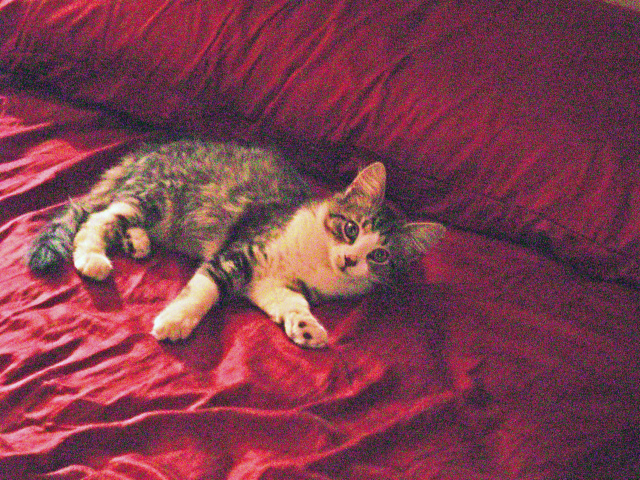 Additional info about the possbile norwegian
Question
Edmund at 4 months
I forgot to mention. Edmund
Additional info about the possbile norwegian
Question
Edmund at 4 months
I forgot to mention. Edmund
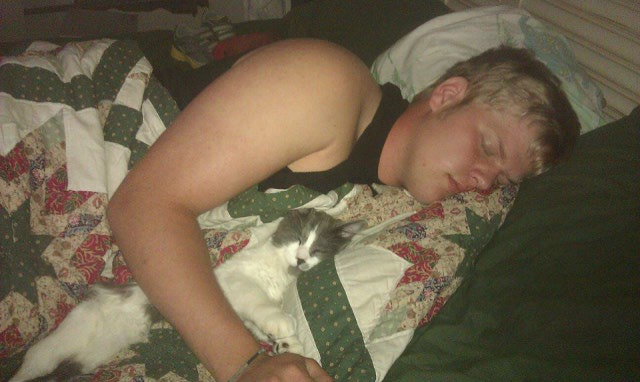 Sick kitty
Question
Kelso
Hi, I rescued a feral cat who was
Sick kitty
Question
Kelso
Hi, I rescued a feral cat who was
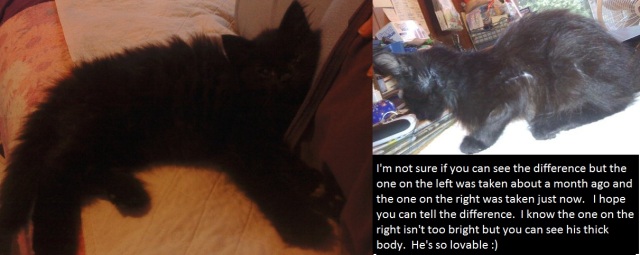 Kitten lossing weight drastically
QuestionTubby before and after
QUESTION: Hello.
Kitten lossing weight drastically
QuestionTubby before and after
QUESTION: Hello.
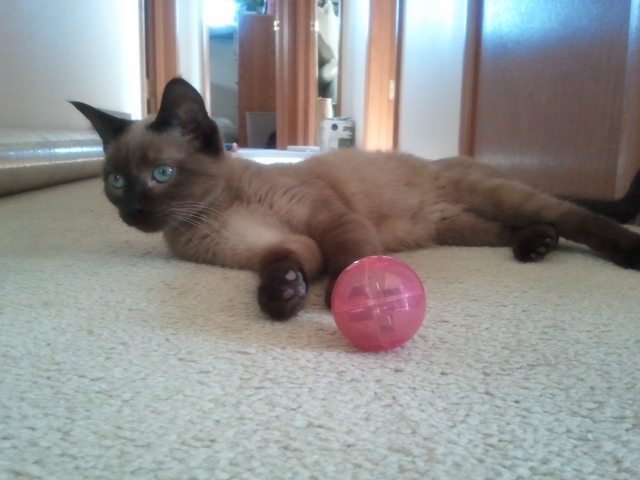 Cinnamon, mysterious Siamese
Question
Cinnamon - mysterious
Hi, I picked you
Cinnamon, mysterious Siamese
Question
Cinnamon - mysterious
Hi, I picked you
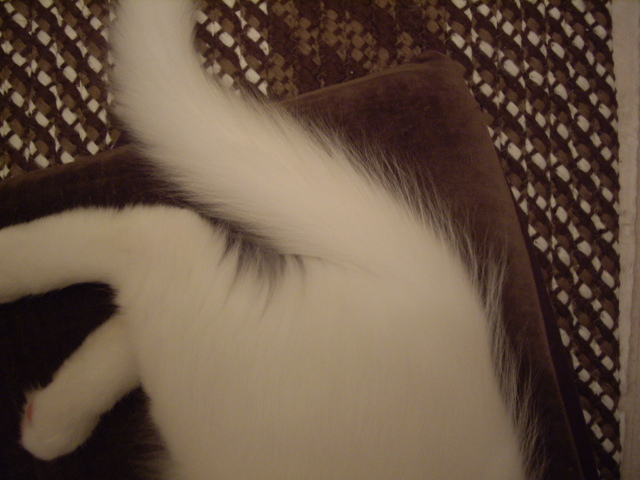 giardia coccidia
Questionthin, spiny guard hair
QUESTION: I took
giardia coccidia
Questionthin, spiny guard hair
QUESTION: I took